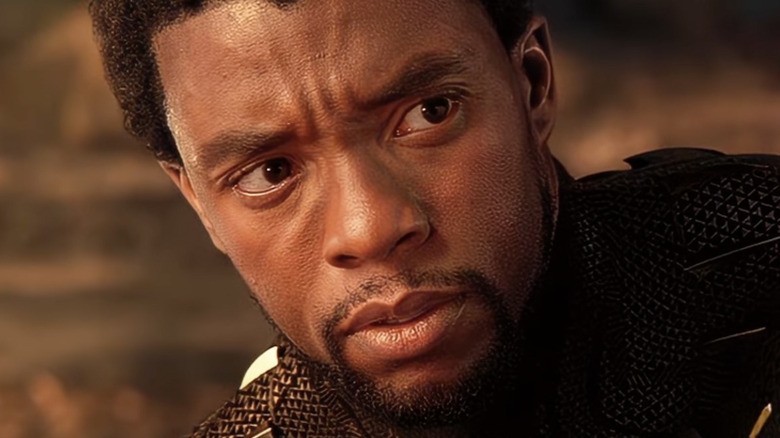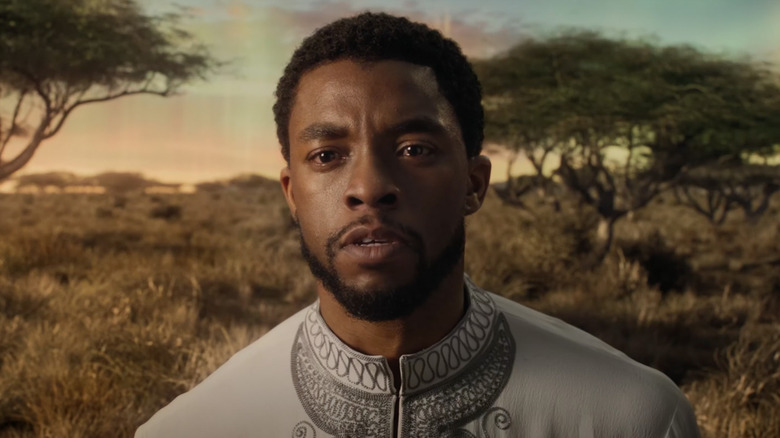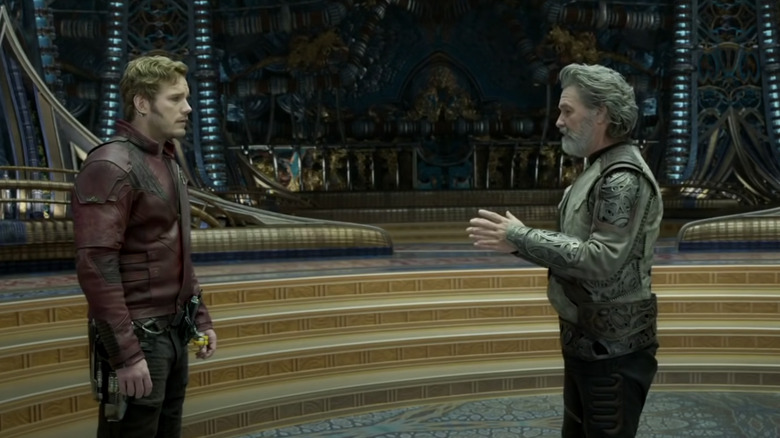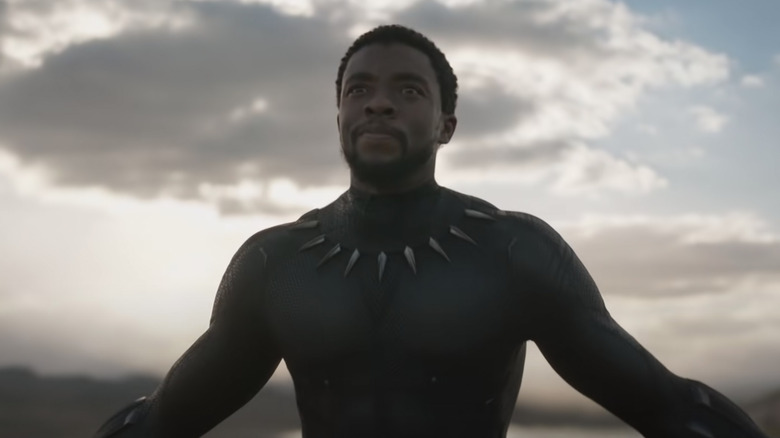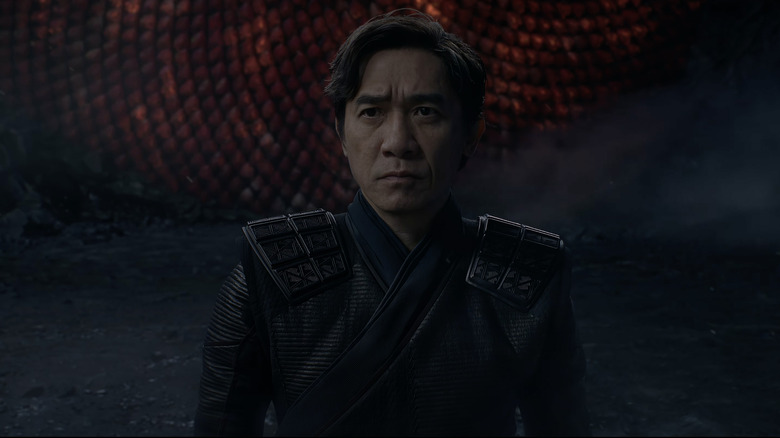Ryan Coogler's Original Black Panther 2 Would Have Tackled This Major MCU Trope In A Unique Way
"Black Panther: Wakanda Forever" has managed to emerge as a triumph against all odds. Though a script was essentially complete, production on the highly-anticipated "Black Panther" sequel was paused after T'Challa actor Chadwick Boseman died from colon cancer in August of 2020, putting the future of the franchise in limbo. After the actor's passing, director Ryan Coogler went back to the drawing board with Marvel Studios, strategizing how a sequel could play out without its lead star. After choosing to not recast T'Challa, Coogler and his "Black Panther" writing partner Joe Robert Cole tried to find the perfect story which paid tribute to the late actor while moving the franchise forward.
The end result was the cathartic "Wakanda Forever," which was released in November 2022. The film opens with T'Challa dying from an unspecified illness, with the rest of the film focusing on his sister Shuri (Letitia Wright) trying to save Wakanda from Namor (Tenoch Huerta), the leader of the underwater kingdom of Talokan. As the two civilizations clash, Shuri has no choice but to take on her brother's mantle and become Wakanda's new Black Panther, all while processing her own grief. Praised by Looper for its deft handling of Boseman's death, the second "Black Panther" outing is another success for the Marvel Cinematic Universe, having grossed over $400 million domestically (via The Numbers).
The curiosity surrounding the production of "Wakanda Forever" hasn't ceased, especially in the wake of the film's release. Cinemagoers have been interested to see what Coogler's original vision for the sequel was and how it handled T'Challa's post-"Endgame" future. In a new interview, Coogler revealed extensive details about the plot, which would have turned a common MCU trope on its head.
T'Challa would have raised his son in the original Black Panther sequel script
While speaking with The New York Times, Ryan Coogler and co-writer Joe Robert Cole opened up about their original idea for the "Black Panther" sequel, which would have tackled the repercussions and effects of the Blip. "It was absolutely nothing like what we made," Coogler said about the original plot. The director continued, revealing that the film would have been about T'Challa and his son with Nakia (Lupita Nyong'o). "It was going to be a father-son story from the perspective of a father, because the first movie had been a father-son story from the perspective of the sons," he said. The first "Black Panther" film dealt with T'Challa coming to terms with his late father T'Chaka's (John Kani) decision to kill his own brother and abandon his nephew, who grew up to become the film's antagonist, Erik Killmonger (Michael B. Jordan).
"In the script, T'Challa was a dad who'd had this forced five-year absence from his son's life," Coogler continued, discussing how the opening moments of the sequel would have been an animated sequence involving Nakia and their son, Toussaint. "You realize that he doesn't know his dad was the Black Panther. He's never met him ... Then, we cut to reality and it's the night that everybody comes back from the Blip. You see T'Challa meet the kid for the first time."
"Then it cuts ahead three years and he's essentially co-parenting," Coogler said. The director then revealed the film would have taken place in the summer, with T'Challa's son joining him in Wakanda on a mission to save the world.
Coogler's original direction isn't too surprising considering a common element in the MCU is exploring the relationships sons have with their fathers. Foundational films like "Iron Man II," "Thor," and "Guardians of the Galaxy Vol. 2," and even recent additions like "Shang-Chi and the Legend of the Ten Rings" have all seen heroes struggling to have relationships with their fathers. However, Coogler's vision definitely would have been intriguing.
The original Black Panther sequel idea would have changed Marvel's relationship with fathers
A consistent trope in the MCU is how the relationships between fathers and sons are fractured and potentially beyond repair. Iron Man/Tony Stark's (Robert Downey Jr.) character arc is largely focused on him coming to terms with the strained relationship he had with his father, Howard (John Slattery). "Iron Man 2" made it abundantly clear that Tony was neglected by his father, leading to a relationship that was material-based rather than emotional.
In the "Thor" franchise, Thor (Chris Hemsworth) is in many ways defined by his relationship with his father, Odin (Anthony Hopkins). The God of Thunder had a bone to pick with Odin since he was first exiled from Asgard, as did Odin's adoptive son Loki (Tom Hiddleston) who always played second fiddle to Thor in their father's eyes.
Similar discussions can be had surrounding Peter Quill (Chris Pratt) and his dad Ego, played by Kurt Russell. Many of Quill's insecurities in the first "Guardians of the Galaxy" stem from him not knowing his father. "Vol. 2" toyed around with Quill's insecurities by having him meet his father, only for their reunion to turn nefarious. The sequel reveals that Ego is responsible for the brain tumor Quill's mother succumbed to. Even worse, Ego only kickstarted a relationship with Quill to take advantage of his Celestial powers in a bid to destroy humanity.
Ryan Coogler and Joe Robert Cole's original idea for the "Black Panther" sequel is disruptive to the trope as it would have gone in a different direction than most Marvel Cinematic Universe films that focus on father/son relationships.
T'Challa would have been a good MCU dad to his young son
While a majority of MCU films that focus on fathers show relationships that are heavily strained, Ryan Coogler's original plan for "Black Panther: Wakanda Forever" would have broken that mold. The MCU is filled with villainous dads, like Ego (Russell) and more recently Shang-Chi's Wenwu (Tony Leung), with many failing opportunities to redeem themselves in the eyes of their respective children. Flashbacks from entries like "Iron Man II" have often shown fathers remain ignorant towards their sons' needs. With such a strong theme of parental neglect in the MCU, it's endearing that Coogler's original "Wakanda Forever" script focused on T'Challa (Boseman) bonding with his son despite missing out on Toussaint's early years.
Coogler had previously revealed to Inverse that the original film would have also tackled grief, with T'challa "grieving time he couldn't get back." The key idea that Coogler suggests is that T'Challa would have also lost the opportunity of raising his son alongside Nakia (Nyong'o) as partners, as she would have remarried a Haitian man during the Blip. Though T'Challa would have needed to deal with the complexities of co-parenting, he still would have been actively trying to make up for lost time while his son was still young.
Coogler's interview also confirmed that Toussaint would take part in Wakandan rituals. "For his eighth birthday, they do a ritual where they go out into the bush and have to live off the land," Coogler said, setting up the plot. "But something happens and T'Challa has to go save the world with his son on his hip. That's the movie." To see a father trying to forge a healthy relationship even as they are busy with superhero duties is drastically different than what has previously been set up in the MCU.
The scrapped script would have told a familiar superhero story in a new way
The original story for the sophomore "Black Panther" entry would have also changed the POV of how Marvel approaches their father/son relationships. Marvel films have always put the focus on sons dealing with the emotional repercussions of their fathers. Ryan Coogler confirmed in his interview that the focus on the sequel would have remained on T'Challa. This perspective would be a deep and personal look into a Marvel father trying his very best.
If previous Marvel films, like "Guardians of the Galaxy Vol. 2" and "Shang-Chi and the Legend of the Ten Rings" featured climaxes involving sons fighting their fathers, the original "Wakanda Forever" plot would have shown a father and son working together. Though Toussaint would have been just eight, the sequel would have seen him joining T'Challa on a mission. One can imagine that this story would lead to several sequences where T'Challa has to protect his son against evil forces, while perhaps setting up the next generation of Avengers.
While "Wakanda Forever" could have changed the way Marvel deals with its many fathers, the sequel audiences received in November is equally groundbreaking by putting the focus on processing grief. The sequel also wraps up its narrative by revealing that Toussaint (Divine Love Konadu-Sun) — real name Prince T'Challa — is with his mother in Haiti, allowing Coogler and Marvel the opportunity to explore the character in the future. In his conversation with The New York Times, Coogler touched upon how this emotionally heavy iteration of the Shuri-led film is equally impactful. "There are things we put in there that felt revolutionary, that challenged the definition of having 'a good time' in a movie like this," he said.
